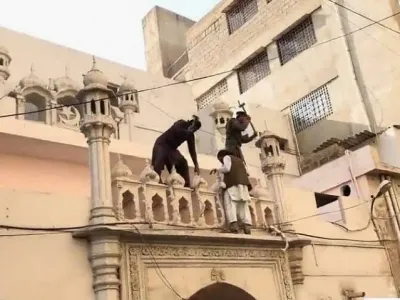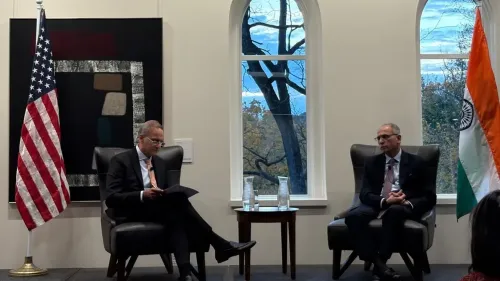Why Are Ahmadi Muslims Being Systematically Persecuted in Pakistan?

Synopsis
Key Takeaways
- Ahmadi Muslims face systemic persecution and violence in Pakistan.
- The government has enacted laws that discriminate against them.
- Societal animosity has led to widespread hostility and violence.
- Raising awareness is crucial for supporting this marginalized community.
- International advocacy can play a significant role in changing their situation.
New Delhi, April 27 (NationPress) On April 18, 2023, a 47-year-old car workshop owner was viciously murdered with sticks and bricks as a mob of hundreds invaded his place of worship, necessitating police intervention to save others in the city of Karachi, Pakistan. This appalling incident, which demands national outrage and profound sorrow, did not provoke a strong reaction from civil society or decisive action from the state.
The underlying issue is that both the victim and the worship site were part of the Ahmadi Muslim minority—a community that consistently endures violent persecution, systematic political and bureaucratic discrimination, and institutionalized oppression within Pakistan.
Every year, reports from government entities, international human rights organizations, and community advocates highlight the ongoing assaults on Ahmadi Muslims in Pakistan by Islamist factions or radicalized mobs, with little to no significant intervention from the state. In certain cases, the state appears to be openly complicit in these actions—such as in March 2023 when police demolished a 120-year-old Ahmadi place of worship following pressure and complaints from Islamist groups claiming it resembled a mosque.
To illustrate the societal persecution faced by this community: Ahmadi Muslim graves are often desecrated and vandalized, while individuals experience continuous harassment, targeted killings, mob violence, unofficial economic boycotts, employment discrimination, and mistreatment on social media platforms. This situation is exacerbated by the alarming frequency of blasphemy accusations against Ahmadi Muslims for reasons as trivial as possessing the Quran, writing Prophet Muhammad’s name on a wedding invitation, or praying in ways deemed distinctly Islamic.
Opposition to the Ahmadiyya community has persisted since its inception in the late 19th century by Mirza Ghulam Ahmad of Qadian in Punjab. The most devastating blow came with the 1974 constitutional amendment, which officially designated them as non-Muslims. Despite sharing most beliefs and practices with mainstream Muslims, Ahmadis diverge in recognizing Mirza Ahmad as the Mahdi or Messiah, a belief that contradicts the Islamic doctrine of Khatam-e-Nubuwwat (the finality of the Prophet Muhammad).
In 1984, General Zia-ul-Haq enacted an ordinance that prohibited Ahmadi Muslims from performing Islamic rites or displaying religious symbols associated with Islam, such as erecting domes or minarets on their places of worship. In 1985, he also introduced segregated voter lists based on religious identity, effectively forcing Ahmadi Muslims to renounce their beliefs in order to participate in elections. This marked the beginning of a formalized system of legal disenfranchisement and persecution that persists today. Although separate electoral rolls were abolished in 2002, Ahmadi Muslims were not included in this reform.
The obligation to renounce their faith has since infiltrated various areas of governance, preventing them from accessing essential state services such as obtaining a passport. Notably, in October 2022, Punjab’s provincial government mandated the inclusion of a declaration affirming the finality of the Prophet Muhammad in marriage registration forms.
The rise of the far-right Tehreek-e-Labbaik Pakistan (TLP), whose supporters were involved in the recent attack and murder of an Ahmadi Muslim man in Karachi, has significantly intensified the climate of fear and marginalization experienced by the community. The TLP gained national prominence in 2017 when it orchestrated a three-week blockade of a major highway in Islamabad to protest a minor amendment to the electoral oath, which they viewed as a weakening of the state's position against Ahmadi Muslims.
In response to their demands, the government reinstated the original wording, leading to the resignation of Law Minister Zahid Hamid. The influence of far-right sentiment is so strong that, in 2018, the Imran Khan-led PTI government capitulated to pressure from extremist groups and asked Princeton professor Atif Mian to resign from his position as Economic Adviser solely due to his Ahmadi Muslim identity.
While the systemic exclusion of Ahmadi Muslims in Pakistan was initiated and continues to be enforced by the state, the profound societal animosity it has cultivated has now exceeded the state's control. Decades of deliberate state policy targeting the community for political gain have inflicted lasting damage on the nation, creating a society plagued by radicalism, self-destructive tendencies, and toxic intolerance.
According to data compiled by the Ahmadiyya community, at least 264 Ahmadi Muslims were killed in targeted attacks, mob violence, and bombings between 1984 and 2018. It is noteworthy that even Pakistan’s first and only Nobel Laureate, Abdus Salam, was not immune to the effects of this pervasive animosity—his gravestone was vandalized to erase the word ‘Muslim’ due to his Ahmadi Muslim identity.









